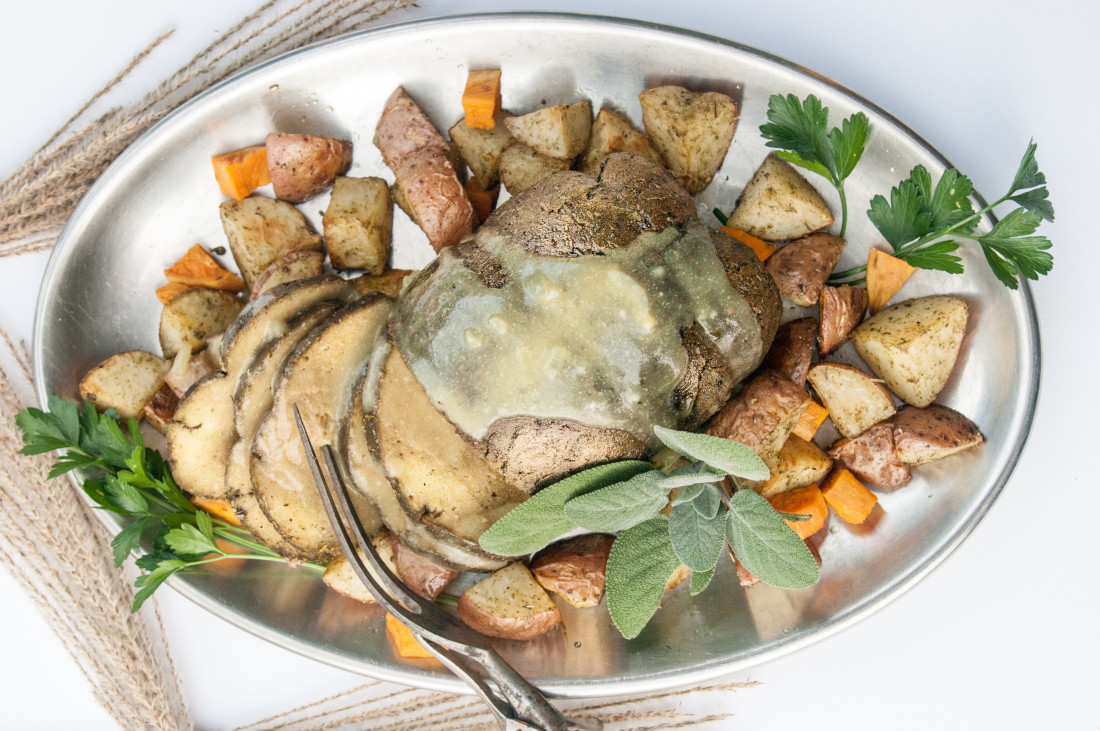What qualifies a dish for main-course status on the holiday table? The traditional standbys — a stuffed turkey, a glazed ham, a standing rib roast — all revolve around a singular, showstopping cut of meat. But the derivation of dinner from the animal kingdom is secondary to the feel of the meal: a savory flavor and satisfying texture between the teeth.
Asheville-area makers of plant proteins argue that this sensory experience can just as readily arise from sources beyond the world of meat. Through the clever manipulation of basic ingredients, these manufacturers are forging animal-free alternatives suitable as the centerpiece for a Thanksgiving celebration.
As No Evil Foods co-founder and operations manager Mike Woliansky explains, achieving the feel of meat doesn’t necessarily require a complicated combination of components. “When you look at the market for plant-based meats, there’s a lot of techy stuff happening right now, but we try to appeal to the customer who wants to see a short ingredient list,” he says. “It’s a focus for us to be better than what you might find coming out of a laboratory.”
Nevertheless, a good amount of science animates the process behind No Evil Foods’ products. Their key ingredient is vital wheat gluten, the protein-packed portion of wheat flour that remains after washing away all of its starch. When mixed with water and kneaded, the glutenin and gliadin proteins in gluten come together and begin to stick — new chemical bonds form between the once-separate molecules, creating a massive network of elastic protein.
Taken together, those countless microscopic links transform the powdery vital wheat gluten into a stretchable, chewy dough. By adding different plant ingredients to this gluten and controlling variables such as moisture and temperature, No Evil Foods can create meatless mixtures that mirror a wide variety of traditional products.
“Each of our formulations is unique and replicates a unique counterpart in the animal world,” says co-founder and product development head Sadrah Schadel. “They share some similarities as far as what goes into them, but the quantities and cooking methods are different.”
For example, the company’s Italian sausage mimic, The Stallion, includes chickpea flour and uses less water to achieve a firm, snappy texture. In contrast, the Mexican chorizo counterpart of El Zapatista omits the chickpea flour and lists filtered water as its first ingredient. The results are softer and juicier, and the product crumbles easily into smaller pieces.
Schadel’s approach to flavor, however, is as conventional as it comes. “It sounds strange coming from my vegetarian and vegan background, but I scoured sausage-making message boards to figure out what the long-standing, best-ever seasoning blends were,” she says. “I applied the same technique to plant protein as other people might do for animal proteins.” While All of No Evil Foods’ products are completely vegan, due to their use of vital wheat gluten, they are not suitable for those with celiac disease or severe gluten sensitivity.
Chad Oliphant, co-founder of Smiling Hara Tempeh, takes a different course to producing a filling filet of vegetable matter. “We consider ourselves fungus farmers,” he explains. A traditional product from the Indonesia island of Java, tempeh is made by incubating a substrate of soaked beans or grains with a mold from the genus Rhizopus.
Over the next 48 hours, the fungus spreads a rootlike network of growth known as the mycelium throughout the substrate, binding individual pieces together into a solid cake that can be sliced and cooked just like a hunk of animal protein. The complex flavor that develops during the process has sweetly earthy notes of nuts and mushrooms.
Oliphant emphasizes that tempeh has benefits beyond taste alone. “The Rhizopus breaks down the proteins in the substrate into simple amino acids, so your body doesn’t have to do that work,” he says. “That makes it easier for you to digest — you don’t get the gassiness that you get from just eating straight beans.”
Smiling Hara is unique among tempeh manufacturers in using hemp seeds as part of its substrate mix. Although not part of the traditional Indonesian process, hemp provides significant amounts of essential amino acids through its protein and is a source of the omega fatty acids more commonly associated with fish. Oliphant says he’s eager to include hemp for environmental reasons as well: “In their rotations with soy, some farmers can switch from corn, which is very demanding on the soil and mostly grown for animal feed, to hemp, which has a lot of advantages across the board,” he says.
Future products in development at Smiling Hara include a chickpea and hemp tempeh, designed for customers with an allergy to the peanuts in the company’s current soy-free product, and a tempeh sausage. When asked how the process will vary for those offerings, however, Oliphant chooses not to share details. “Some of the secrets you’ve got to keep,” he says with a laugh.






Before you comment
The comments section is here to provide a platform for civil dialogue on the issues we face together as a local community. Xpress is committed to offering this platform for all voices, but when the tone of the discussion gets nasty or strays off topic, we believe many people choose not to participate. Xpress editors are determined to moderate comments to ensure a constructive interchange is maintained. All comments judged not to be in keeping with the spirit of civil discourse will be removed and repeat violators will be banned. See here for our terms of service. Thank you for being part of this effort to promote respectful discussion.